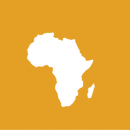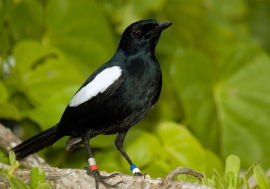Africa Watch
ENVIRONMENT
Initiative to save Congo forests
Key donor institutions made initial pledges of $216 mn to help save the vast forest areas of Central Africa’s Congo River basin at the mid-June launch of the Congo Basin Forest Fund (CBFF). Africa has numerous development priorities, CBFF co-chair Wangari Maathai, a Nobel Prize laureate from Kenya, noted at the event in London. “Africa has to make very tough choices, and she has to feed herself. But it’s very important we do not sacrifice indigenous forests for biofuels or any other alternatives.”
More than 50 million people live in the Congo basin forest region, which covers about 2 mn square kilometres of territory across 10 countries, including the Democratic Republic of the Congo. In addition, it is home to 10,000 species of plants, 1,000 species of birds and 400 species of mammals. But these forests are threatened by human activities, such as agriculture and road construction, as well as by climate change. The UN estimates that if the current rate of deforestation is not halted, some two-thirds of the forests will be gone by 2040.
Donald Kaberuka, president of the African Development Bank, which is hosting the CBFF, noted that African countries need stronger capacities to manage their forests. “If we succeed, and we must, the people of the Congo Basin will have made a major contribution to humanity.”
HAZARDOUS WASTE
Senegal deaths highlight toxic dangers
Officials of the World Health Organization (WHO) have called for emergency international aid to clean up dangerously high levels of toxic lead following the deaths of 18 children in the NGagne Diaw section of Dakar. WHO investigators called in by the Senegalese government found lead concentrations many times higher than safe limits in the area, where residents salvage and sell lead from disused car batteries. About 1,000 people were affected. The UN health agency has called for urgent international assistance to local authorities to decontaminate the area and help treat the victims, many of whom have suffered brain damage and severe nervous system disorders.
The incident has renewed calls for stricter controls on the recycling and disposal of toxic waste in African and other developing countries, where oversight is generally weak and few companies have the expertise to handle hazardous materials. At least 15 people died and thousands more were sickened in Abidjan, Côte d’Ivoire, in 2007 after a foreign oil company dumped contaminated wastes in open pits.
In late June, African efforts to pass an international ban on exports of toxic wastes were defeated by the US, Japan and other industrialized countries at a meeting in Bali of signatories to the Basel Convention, which governs the international movement of hazardous waste.
Appointments
 Photograph: UN Photo
Photograph: UN PhotoMr. Alain Le Roy of France has been appointed UN under-secretary-general for peacekeeping operations, replacing Mr. Jean-Marie Guéhenno, also of France. Mr. Le Roy was recently counsellor at the Cour des comptes (the French audit office). His extensive experience in public administration, management and international affairs includes postings as deputy to the UN special coordinator for Sarajevo, a UN regional administrator in Kosovo and French ambassador to Madagascar.
 Photograph: UN Photo / Mark Garten
Photograph: UN Photo / Mark GartenMr. Miguel d’Escoto Brockman of Nicaragua has been elected president of the United Nations General Assembly, for its 63rd session opening in September. He served as his country’s foreign minister from 1979 to 1990 and in February 2007 he was appointed special senior adviser, with the rank of minister, for foreign policies and boundary issues to Nicaragua’s current President Daniel Ortega Saavedra.
 Photograph: UN Photo / Eskinder Debebe
Photograph: UN Photo / Eskinder DebebeThe UN Secretary-General has appointed Ms. Inés Alberdi of Spain as executive director of the UN Development Fund for Women (UNIFEM). Ms. Alberdi has more than 25 years of professional experience on issues of gender, including as a senior adviser on women in development at the Inter-American Development Bank. Ms. Alberdi replaces Noeleen Heyzer, who last year assumed the position of executive secretary of the UN Economic and Social Commission for Asia and the Pacific.
 Photograph: UN Photo / Evan Schneider
Photograph: UN Photo / Evan SchneiderMr. Said Djinnit of Algeria has been appointed by the UN Secretary-General as special representative and head of the UN Office for West Africa (UNOWA). Mr. Djinnit previously served as the commissioner for peace and security at the Africa Union, among other positions there, including as chairman of one of the task forces that helped transform the previous Organization of African Unity into the African Union. He has also served in various diplomatic missions for his country. At UNOWA, he replaces General Lamine Cissé, who was officer-in-charge since September 2007.
 Photograph: UN Photo
Photograph: UN PhotoMr. Tayé-Brook Zerihoun of Ethiopia has been named the UN Secretary-General’s special representative in Cyprus and head of the UN Peacekeeping Force in Cyprus (UNFICYP). Since August 2004 he was the Secretary-General’s principal deputy special representative in the UN Mission in Sudan (UNMIS), and in October 2007 was appointed chief UN mediator for the Darfur peace talks. He previously was a director on Africa in the UN’s Department of Political Affairs.











